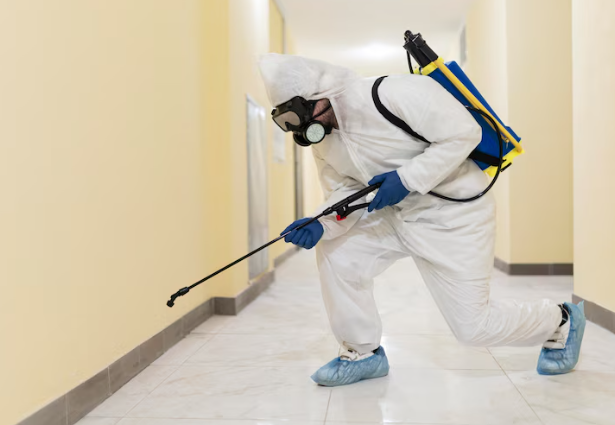Image Credit: FREEPIK
Vacant apartments may seem like the perfect retreat for pests. Without human activity, pests like cockroaches, rodents, and ants thrive, making your future move-in a nightmare. To ensure a pest-free environment, understanding the essentials of cleaning and pest control is vital.
Let’s dive into the step-by-step process of how to clean a vacant apartment of pests.
Preparation for Cleaning
Initial Inspection
Identifying pest hotspots
Start by inspecting the apartment. Check dark corners, under sinks, inside cabinets, and along baseboards. Look for droppings, chew marks, nests, or dead pests.
Types of pests to look for
Common invaders in vacant apartments include cockroaches, ants, rodents, spiders, and even termites. Knowing what you’re dealing with helps determine the right cleaning and control strategies.
Assembling Your Tools and Supplies
Cleaning supplies checklist
Gather essentials like a vacuum cleaner, mop, disinfectant, gloves, and trash bags. These tools will ensure you tackle grime and debris effectively.
Pest control products to have on hand
Invest in sprays, baits, traps, and natural deterrents like diatomaceous earth or essential oils. A multi-faceted approach works best.
Deep Cleaning Steps
Cleaning Floors and Carpets
Removing debris and residues
Sweep and vacuum every room, focusing on corners and crevices. A clean floor eliminates crumbs and dirt that attract pests.
Treating carpets for pests
If the apartment has carpets, steam clean them to kill any hidden bugs or larvae. Sprinkle boric acid or baking soda beforehand for added pest control.
Cleaning Walls and Ceilings
Spotting pest activity on walls
Pests often hide in cracks or leave trails along walls. Check for discoloration, chew marks, or sticky residues.
Removing cobwebs and nests
Use a long-handled duster to clear cobwebs and remove any visible nests, especially in high corners or near windows.
Kitchen and Bathroom Cleaning
Eliminating food remnants
Pests love kitchens. Scrub counters, cabinets, and appliances. Discard any food debris lurking in hard-to-reach areas.
Disinfecting surfaces prone to pests
Clean sinks, drains, and tiles with a powerful disinfectant. This step removes bacteria and deters pests from returning.
Dealing With Furniture and Stored Items
Inspecting and cleaning stored furniture
Vacant apartments with stored items need special attention. Inspect furniture for signs of infestation, then vacuum and sanitize them.
Disposing of infested items
If you find heavily infested items, dispose of them responsibly. It’s better to part with contaminated furniture than risk spreading pests.
Pest Control Measures
Choosing the Right Pest Control Methods
Chemical vs. natural remedies
Chemical solutions like sprays and foggers are effective but can be harsh. Natural remedies, such as vinegar or peppermint oil, are safer alternatives.
Using traps and baits effectively
Set traps and baits strategically in areas with high pest activity. Check and replace them regularly.
Professional Pest Control Services
When to call a professional
If the infestation is severe or persists despite your efforts, it’s time to hire experts. They have specialized tools and knowledge to tackle complex problems.
Benefits of expert intervention
Professionals can ensure long-term pest prevention by targeting hidden infestations and using advanced techniques.
Preventive Measures
Sealing Entry Points
Identifying gaps and cracks
Inspect windows, doors, and vents for gaps. Even the smallest openings can invite pests.
Best materials for sealing
Use caulk, steel wool, or weather stripping to seal potential entry points effectively.
Maintaining a Clean Environment
Regular cleaning tips
Sweep and mop floors regularly. Pay attention to areas under furniture and appliances.
Importance of garbage disposal
Take out the trash frequently. Ensure garbage bins are tightly sealed to prevent attracting pests.
Ongoing Pest Monitoring
Setting up pest monitoring traps
Sticky traps or electronic monitors can help you identify pest activity early.
Knowing when to take action
If you notice an uptick in pest activity, act immediately. Early intervention saves time and effort.
Conclusion
How to Clean a Vacant Apartment Of Pests? Cleaning a vacant apartment thoroughly and implementing pest control measures not only ensures a healthy living environment but also saves you from costly repairs or infestations later. Stay proactive, and you’ll enjoy a pest-free home.
Also Read: How Was The Goddess Replaced With A Male God
FAQs
1. What are the first signs of a pest infestation in a vacant apartment?
Common signs include droppings, unusual smells, gnaw marks, and sightings of live or dead pests.
2. How often should I check a vacant property for pests?
Inspect at least once a month to prevent infestations from escalating.
3. Are DIY pest control methods effective?
Yes, for mild infestations. For severe issues, professional intervention is recommended.
4. How long does it take to clean a vacant apartment of pests?
Depending on the severity, it can take a few hours to a couple of days.
5. What is the cost of professional pest control services?
Costs vary based on location and severity but typically range between $100-$300 per session.




